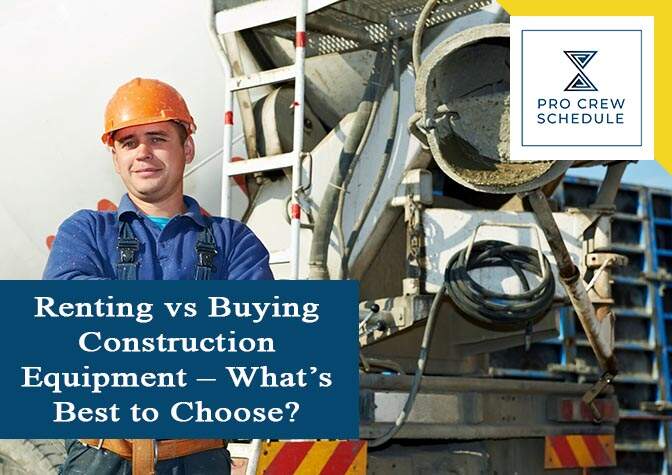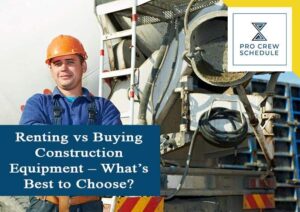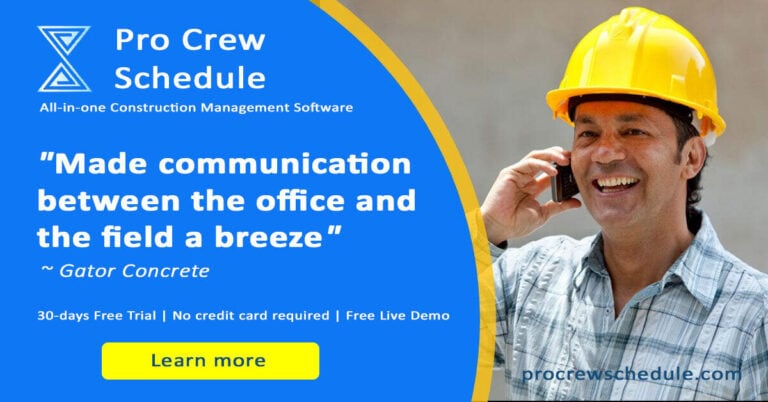How many times you’re locked into renting or buying a construction tool or equipment? Are you still figuring out if there’s a right or wrong decision? There isn’t. It is already well-known that today’s construction industry is very competitive that even the minimal additional costs can quickly knock you off from the top bidder spot.
These construction tools and equipment buy or rent in many instances. However, the final decision typically depends on how frequent and how you will prorate some of the costs. So what should you do? You rent, or you buy your own equipment?
This blog will help you further understand many key indicators that will drive your decision to either buy or rent construction equipment
Take Time to Examine First
It will help you step back and analyze the cost-benefit situation applicable to your construction business. A logical decision will result after you consider the following factors:
- Approximate costs of a new machine
- Transportation and storage expenses
- Estimated rental payments for the machines needed and periods of use.
- Projected life span of the new machine
- Frequency of need for equipment
- Rough amount of labor being saved with either option (rent or buy)
- Estimated costs for service and maintenance over its life
- Available capital and financing options
- Need for special skills and scheduling management programs with your projects or equipment
- Availability of new purchased equipment
- Multiple and possible uses for machines both purchased and rented.
- Internal capability to maintain, test and service machines.
A cost-benefit analysis can result in a much broader sense of which option fits best, including where and why. The most often recommended benchmark for when it is time to cross over from purchase to rental is whenever the equipment is essential. Your examination of tools and equipment will reveal valuable data to decision-making, things like usage duration, profit, hours saved or wasted, and capital or financing in the future.
You can use some specialized web-based inventory software to track various elements and collect data. Use the information collected when you’re deciding whether to purchase or rent construction equipment.
When to Rent Construction Equipment
Companies decide to rent construction tools and equipment over purchasing them for some different reasons. Some companies, especially the large and established ones, can increase or decrease their fleet when necessary. Small to mid-size construction companies, on the other hand, can able to rent specialized tools and equipment at reasonably lower costs. But there are several other advantages when you go with a rental.
Avoid operational expenses – if you purchase equipment, you also need to keep a small team to maintain the machine regularly. Hydraulics, fluids, and parts should be changed, and technologies are upgraded. When you go on renting, everything can all be taken care of by the rental service provider.
Save up-front investment – Heavy equipment such as excavators and earthmovers can take up tons of investment that may remain stuck until you sell it. And if you happen to sell it, you might not get the price that you expected. Renting construction equipment can save you from this kind of hassle.
Free up the costs of transportation and storage – when you rent, you can allow the service provider to deliver and pick up the equipment on demand. Construction of huge storage spaces isn’t necessary anymore, especially for times when construction isn’t needed.
Maintain strong balance sheets – if you’re considering taking loans, be mindful that banks never consider rental equipment costs as a liability. The machines that you own, on the other hand, will be considered as capital-equipment debts in the books. But with construction equipment rental, you can firmly maintain a healthy borrowing power.
Tax benefits – rental payments are regular expenses that can be more advantageous compare to the upfront costs of purchase. The latter is often calculated as a depreciating asset over time. You might also get some tax benefits when you rent, depending upon the nature of your construction business.
Environmental and legal compliances – no company ever wants to be caught in the middle of compliance issues, especially when it fails to handle them responsibly. However, with the rental, all compliance-related matters can be taken care of by the service providers, leaving you free to assess further and focus on your core business.
Reduce the waiting time – With your business type, you don’t want to keep any labor idle whilst the equipment arrives or remains installed on-site. Be it a large excavator, a storage frac tank, and you can rent any of the equipment with a quick turnaround time. Use construction scheduling software to take control of monitoring.
Renting and using advanced software tools will save you money, time and even helps you to meet the project targets.
Maintain market competitiveness – Even if you’re business is small, you can still get projects because you have open access to all the equipment that a large company owns. This will give you a competitive edge whenever you negotiate for new projects.
Try the product before purchasing – if you wanted to buy a piece of equipment, but you’re not sure about it, you can rent it and test it afterward before buying.
Eliminate coordination headaches – rental provides a win-win cycle for business because some experts have maintained and serviced the equipment. Hence, it is less likely to break down or malfunction. And if something does go awry, the client can call the same experts to determine what’s wrong. Renting equipment can alleviate the organization and concerns required to obtain proper training, service, maintenance, and machine scheduling.
Renting opens up new opportunities – Deciding to rent opens up your construction business for projects that are further than regular construction. You can’t buy all the equipment possible, but you can rent them if you are foraging into road construction or other specialized projects.
Renting Benefits
When you aren’t sure, begin by renting tools needed for the job as it will provide information about the maintenance and cost to calculate a payback period. The renting experience can determine how efficient your production is whenever the tools are being used constantly instead of being the option.
The overall costs will typically be baked in using the rental construction tools and can be passed as indirect or overhead costs during project execution. Rental expenses generally are considered business expenses and can be deducted on an annual basis. Renting is very beneficial, especially when your company’s funds aren’t sufficient enough to have an initial investment. By renting, you also have access to the latest line of equipment, and you will not carry the costs of insurance plus maintenance.
When to Buy Construction Equipment
Generally, you must buy the equipment if you needed it for more than sixty percent of the project’s duration (s). To further assess this, you may either use inventory management software. This specialized tool can help you input and track every piece of equipment, including its history, expected lifespan, and associated costs.
Below are some factors you also need to consider when purchasing construction tools and equipment:
Availability of the equipment – some rental companies negotiate with multiple clients. There’s a slighter chance that the construction equipment might not be available in the rental company when you need it. If the project is high-priority, and you cannot afford to wait, consider purchasing the equipment.
With the equipment available 24/7, you are ready to handle emergencies and any last-minute jobs.
Purchase used equipment – Fortunately, you don’t need to purchase new tools and equipment every time. Some rental companies are offering used construction equipment and they are for sale! You can get any of it at attractive and reasonable prices.
Cost of Financing and depreciation – Equipment manufacturers always develop financing schemes at good interest rates to help you purchase the equipment. But you should also know that the equipment starts breaking down its resale value on the day it arrives at the facility. Ensure also to do an analysis of the expenses in renting and financing lifecycles.
Buying Benefits
As previously stated, if you are using the tool or equipment more than sixty percent of the time, you must consider buying it. Buying construction equipment and tools is a decision that significantly affects your immediate opportunities of providing a lower price to your clients. If you’re buying equipment, always think about tax benefits it can provide, including how the costs depreciated and amortized.
Owned construction tools and equipment are considered assets that add to your balance sheet, helping you during a difficult time since each of them can be sold. If you own the equipment, it’s easier to dictate the pace and figure out when to use and for how long.
Use online inventory software to manage your construction tools and equipment more effectively. Advanced software such as this can give you a bird’s eye of your entire business, including inventory, project and your people. It also provides real-time data that are necessary for making informed decisions.
New to this tech? Schedule a demo with our product experts and get 30-day FREE trial!
Key Takeaways
If you decide to either purchase or rent any piece of construction equipment, do your research first. Also, make a comparison of different brands and models. Certain machines hold their value much better than any other machines in a similar category and will be more than worth it.







